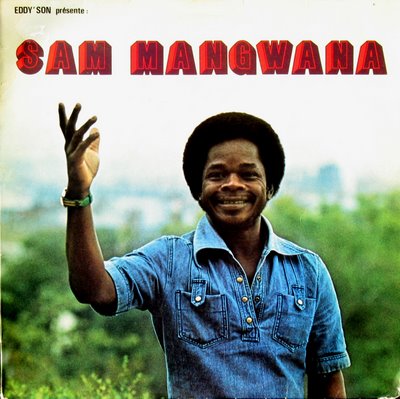
Sam Mangwana: Spiky-voiced Zimbabwean who re-tuned Franco’s and Congolese rumba music calls time on illustrious career
In African folklore, it is often anything and everything good will always have and end. Kiswahili speakers in East Africa know the proverb: Mwenda omo na tezi, marejeo ni ngamani, which means, ‘After travelling abroad and meeting hardship, a person finally comes home to a secure place.’
Former TPOK’s foremost vocalist, composer and arranger Sam Mangwana has retired from music and settled back in Zimbabwe, where his father came from.
Back in the day, when the ‘Shakespeare of African music,’ Simaro Lutumba, was asked to name a vocalist he felt delivered his poems better, he unequivocally picked Sam Mangwana.
Indeed, Mangwana brought to life songs like Ebale ya Zaire, Mabele, and Faute ya Commercant in a way that captivated audience. While Simaro had composed several songs prior to this, it was these two 1973 tracks that hoisted him to international fame as one of Africa’s most polished composers and astute poets, with lyrics that were rich in African philosophy and metaphor. Simaro was revered as TPOK’s ‘thinking head.’
The fact that Simaro regarded Mangwana as the greatest, despite working with other vocalists like Josky Kiambukuta, Vicky Longomba, Youlou Mabiala, Djo Mpoyi, Malage De Lugendo and Carlito Lassa, among many others, sheds light on Mangwana’s immense talent.
In Ebale Ya Zaire, Mangwana achieved the remarkable feat of aligning the song’s emotions with the story. The listener can feel the frustration of a man sitting by the Congo River, watching his lover sail away and disappear into the fog.
“Mangwana was a phenomenal singer,” says Prof Larry Gumbe, a Nairobi-based engineer and rumba music lover. He notes that the songs Mangwana vocalised became instant hits.
Although Tabu Ley spotted Mangwana’s talent during stint at African Fiesta when he was only a 17-year-old student, this massive talent in the formative years was somewhat understated. From African Fiesta, Mangwana performed with several other bands in both Kinshasa and Brazzaville before he landed at TPOK. His influence became more pronounced in the mid-1960s when he featured with Vox Africa, led by Jeannot Bombenga and African Fiesta National following the 1965 split with Dr Nico.
His 1966 composition, Djibebeke, exemplifies Mangwana’s linguistic versatility, as he sang in multiple languages, showcasing his ability to connect with diverse audience. He also participated in several recordings with Tabu Ley during this time, including hits like Pangoula and Djeke.
The period between 1964mand 1967 marked the turning point of his career. The songs he created with the band during this era exemplify his flawless tenor and his collaborations with fellow vocal giant Ley further solidified his reputation as a top-tier vocalist, making him a sought-after talent.
In 1967, Mangwana left with fellow musicians, including soloist Jean Paul Vangu aka Guvano and rhythm guitarist Johny Bokassa to form the popular band Festival Des Maquisards. They worked with Michelino Mavatiku Visi, Dizzy and among others, producing bestseller tracks like Nzela Ngai Nasala, cementing Mangwana’s position as a leading figure in Congolese rumba.
Although the band was short-lived, Mangwana continued his journey, collaborating with Guvano in a group called Mangwana et Guvano. Their well-received album featured a high-paced Charanga adaptation.
Mangwana’s musical journey continued as he performed and travelled with various bands, which earned him the monicker Le Pigeon Voyageur or The Carrier Pigeon. In 1973, he joined OK Jazz (OKJ), a band that had already established itself as a big name in African music. The band’s line-up included members from across the region such as Youlou Mabiala and Celi Bitshou from Brazzaville and Manuel D’Oliveira from Angola.
Mangwana’s inclusion gave OK Jazz an even more international outlook unlike Tabu Ley’s Afrisa International, whose claim to internationalism was primarily reflected in its name and performances at the Olympia. At OK Jazz, Mangwana’s impact was immediate. He became the band’s most admired vocalist with songs like Asitou and Alimatou becoming huge hits, thanks to his unmistakable golden voice. His renditions of tracks like Nganda Ma Camlagne” and Toboya na Kaka further cemented his remarkable vocal range and ability.
Although Mangwana left OK Jazz in 1976, he briefly re-joined Afrisa and recorded hits like Mose Konzo and Minha Angola. Despite not being a full-time member, he contributed to numerous recordings and performed at many concerts.
During the Festac Festivals in Lagos, Nigeria, some members of Afrisa International, including Ringo Kandiaga and Lokassa ya Mbatha, among others, chose to stay behind and formed a new group called African All Stars. Mangwana joined this band, which became one of the most enigmatic and storied ensembles in the genre. They released numerous tracks, including Bana Ba Cameroon, Souzana Coulibaly and Fatimata.
Being Franco’s close friend, he collaborated with him on several projects, including the popular album Forever, which is considered Franco’s official farewell to his fans. Mangwana is also remembered for being by Franco’s side in his final days, a testament to their close friendship.
In his latter years, Mangwana retired from active music and settled in Angola, although he occasionally returned for special appearances and recordings. As he ages, the details of his personal life, including his marital status, remain somewhat hazy. Friends and family members never open up whenever the question come ups.
For over six decades, Mangwana has moved between various bands, leaving an indelible mark on African music. Born in Kinshasa to an Angolan mother and a Zimbabwean father, Mangwana’s musical journey spans West, East and Central Africa, making his mark to the continent’s music indelible.
- A Tell Media report / By Jerome Ogola







